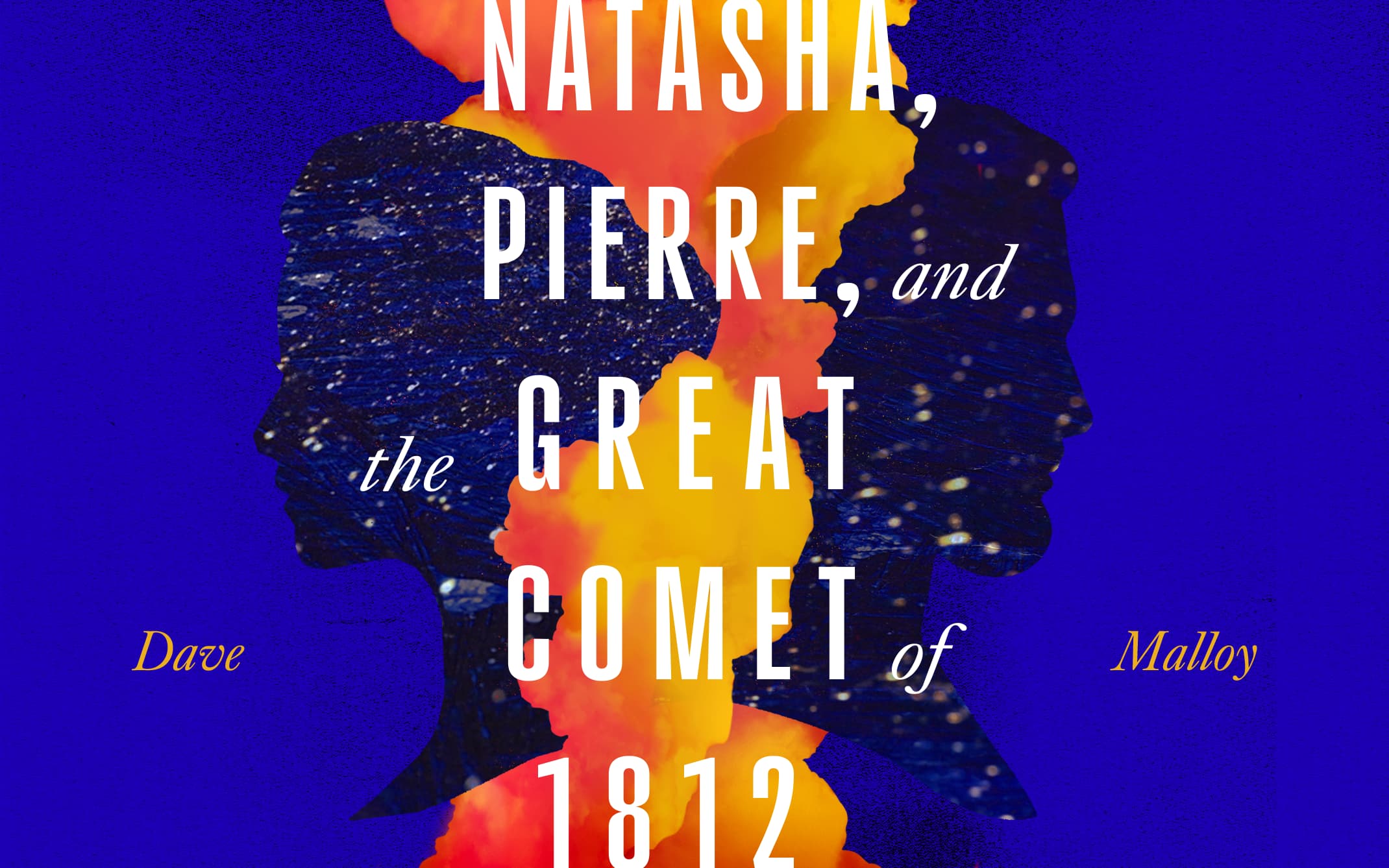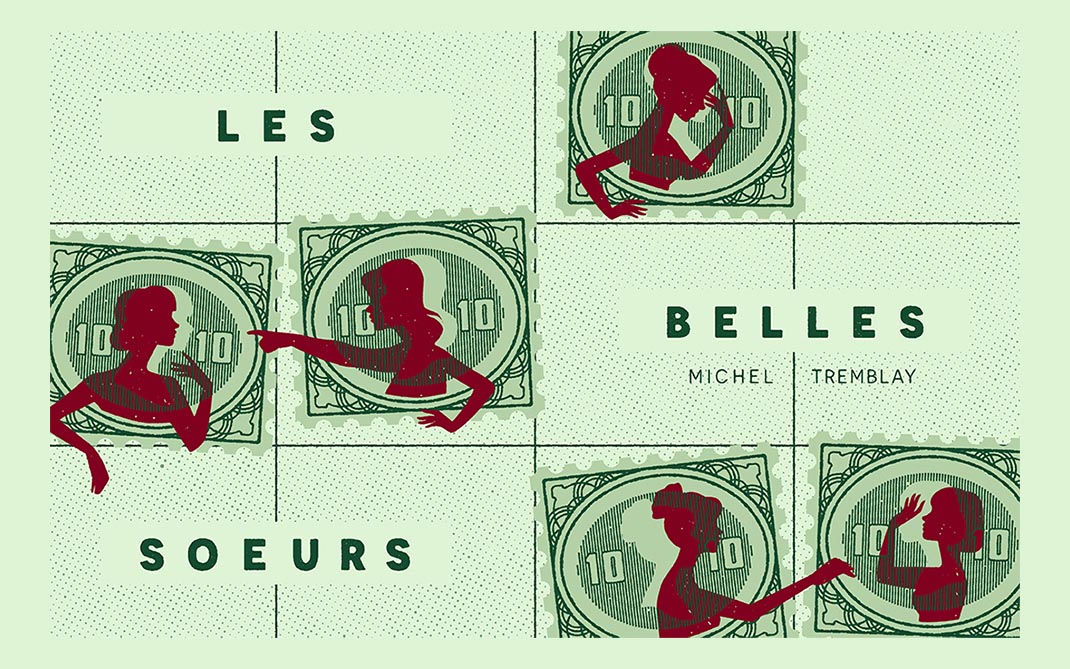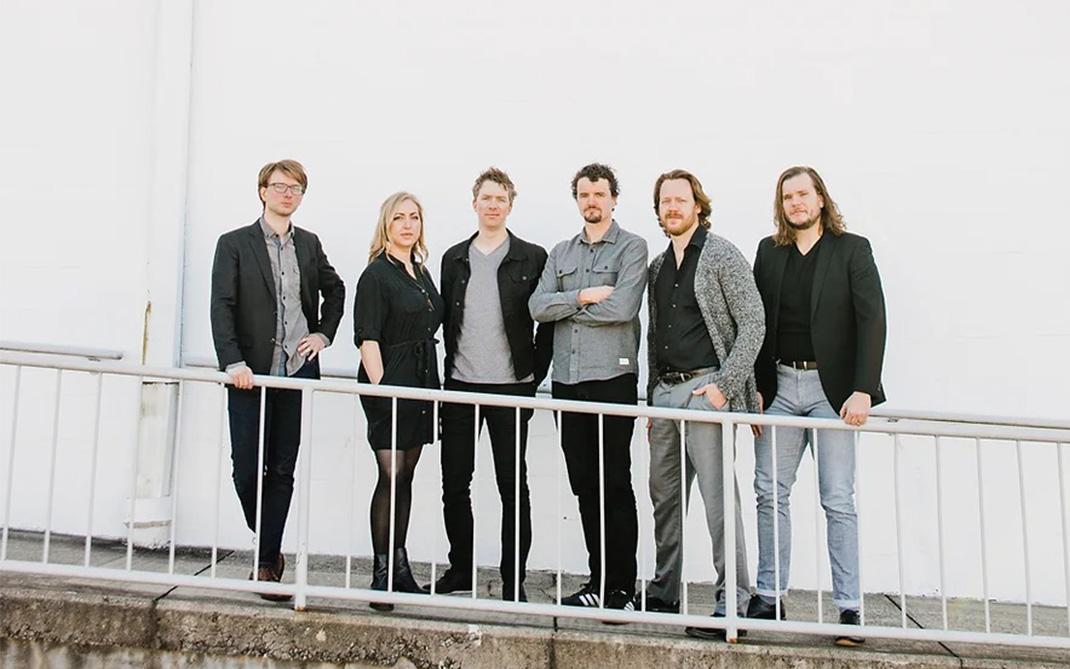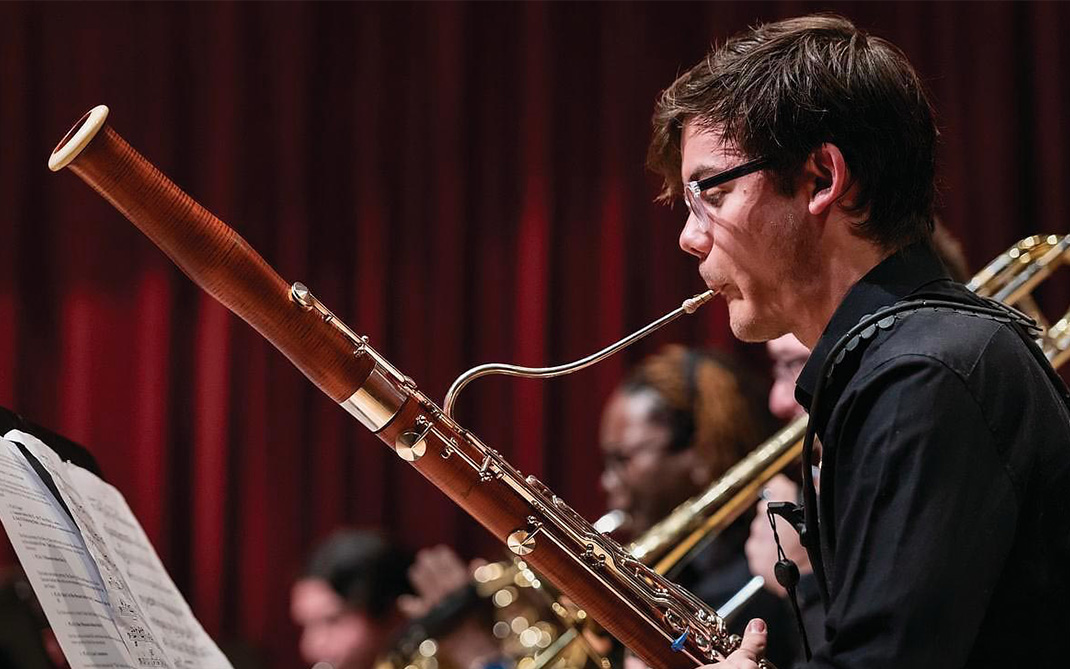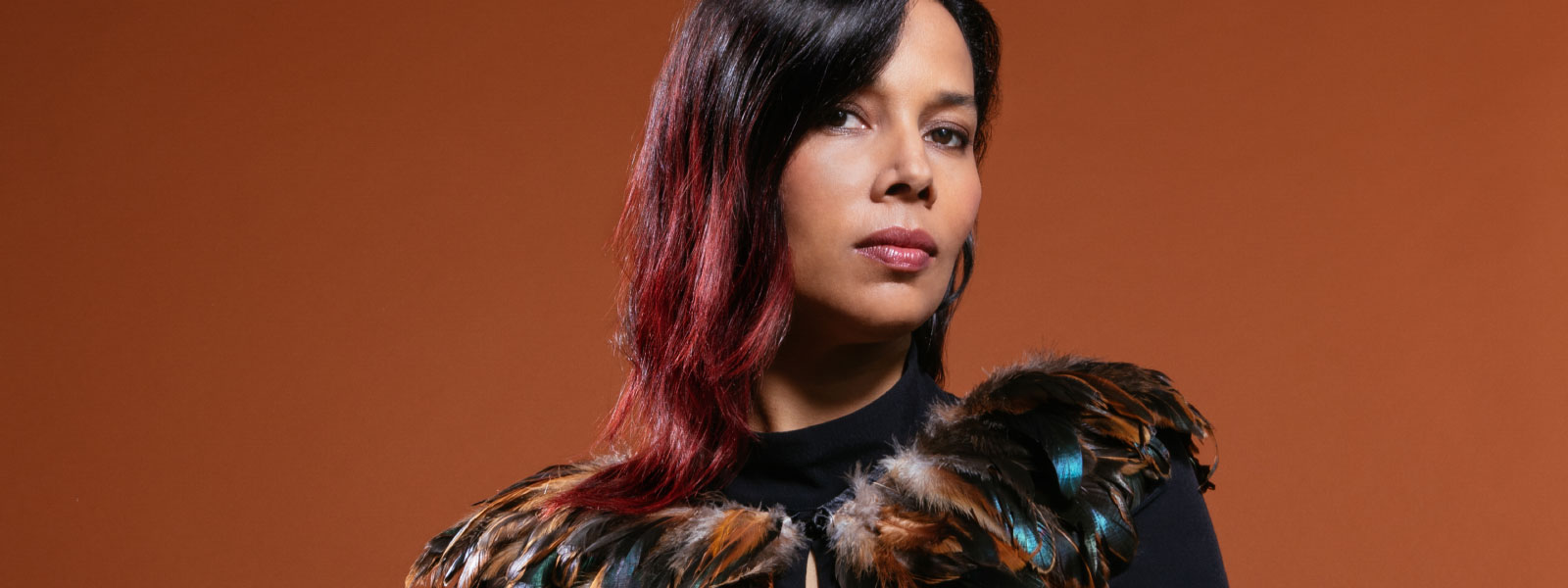Artist As Leader: Rhiannon Giddens
Rhiannon Giddens has in the last decade become one of the country’s most highly regarded bluegrass musicians, picking up a Grammy Award and an International Folk Music Award along the way. From her conservatory training at Oberlin as an opera singer through her co-founding of the band Carolina Chocolate Drops and her more recent solo career and numerous eclectic collaborations, Rhiannon has also remained at heart a historian.
Deeply steeped in the history of the African-American string band tradition, particularly from the Piedmont area of North Carolina where she grew up, she delights in reminding her audience of her musical lineage and of the too-often-overlooked musical giants, the black men and women, who helped shape a truly American sound.
It is this combined passion for music and history that led the MacArthur Foundation to award her a “genius” grant in 2017, stating, “Giddens’s drive to understand and convey the nuances, complexities, and interrelationships between musical traditions is enhancing our musical present with a wealth of sounds and textures from the past.”
In this interview, she candidly discusses several difficult lessons she learned on her path to leadership as she learned to trust her instincts and her commitment to the art form.
Choose a question below to begin exploring the interview:
- Is there a moment you realized you had transitioned from just being an artist to an artist leader?
- To what extent do you see your background, your training and your upbringing informing how you lead?
- Do you think being an artist allows one to be more flexible, to change into insecurity and into the unknown?
- Could you talk a little bit about your transition from being a peer to becoming a boss?
- Could you share some specific lessons you learned in that transition and tell us about some of those difficulties you overcame?
- What advice do you wish you’d received when you were just starting to move into an artist leadership role?
- Epilogue
Rob Kramer: Is there a moment you realized you had transitioned from just being an artist to an artist leader?
Rhiannon Giddens: I think the first concrete moment I had thinking about that was making the speech for the International Bluegrass Music Association. They came to me earlier in the year and they said, “We want you to make the keynote speech for our organization, for our big festival in the fall.” And I said, “I mean, you know what I do, right?” And they were like, “Yes, that’s why we want you.” And I was like, “So I can say what I want to say?” And they were like, “Yeah! I mean, within reason of course.” So the impact of that speech … I didn’t really think about it beyond, “I just want to take this opportunity to say some stuff that needs to be said about Bluegrass and the situation that surrounds it and diversity therein and all that.” And it was picked up and quoted. and people talked about it the next day. And I was like, “Oh, OK! This is not me making a record; this is me making a speech.”
I’m in a position to use the knowledge that I have gained and also the people that I have assembled. I have a network of people that know a lot more than I do but don’t maybe have the platform that I do, and so we have formed this web where I make sure that everything’s right. So then the info gets out there in a way that other people are now able to access.
Rob: So shaping the message in a way?
Rhiannon: Yes. I have a slightly bigger platform than I have had, and I’m also a very persnickety, detail-oriented person, which doesn’t always go along with being a singer, you know? And I double-check all of my info; I make sure that it’s all footnoted; I make sure that it’s all correct. I feel like that’s really important because there’s so much misinformation that goes out there and there’s so many lazy … I don’t mean to be rude, but there’s a lot of people who are very lazy about the information they’re putting out into the world. And people who come from the arts, we have to be triple-careful because people are already going to say, “Well what do you know? You’re just an artist.” So I try to make sure that my information is as well documented as it can be. And so I have to make sure I have relationships with the people who have this information and go, “Hey, I’m going to say this tomorrow. Is this right? Or is this as right as you can tell?”
I’ll do whatever I want in the recording studio, but if I’m going to talk about it, I want to make sure that I’m talking about it in a correct way.
I feel good about the fact that that’s a combination I have in particular that I don’t know that everybody has, that I have a very strong artistic instinct but also I have very pedantic “but where does it say that?” I’ll do whatever I want in the recording studio, but if I’m going to talk about it, I want to make sure that I’m talking about it in a correct way. Because the real information is always more interesting than the quasi-mythical crap that is being touted as this story because it’s an easy story to tell. The real stuff is always harder.
Rob: Yes. To what extent do you see your background, your training and your upbringing informing how you lead?
Rhiannon: I’ve always had a slightly-obsessive-but-not-completely sort of thing. I get halfway into something and then boom, I’m into something else. So I had the messiness that meant that I didn’t finish a lot of projects, but I had the focus that meant that I got pretty deep in them. And then going to conservatory … I went to conservatory from scratch. I didn’t know how to read music. I didn’t know most of the western or classical cannon. I just knew what everybody else knows, stuff from Bugs Bunny [she laughs.] I believe that was a really good experience for me because it taught me that anything can be learned from scratch as long as you work hard enough at it and give it enough time.
Gosh, it was hard, but I went from not knowing anything other than “Sit up straight and don’t breathe through your shoulders” and “Every Good Boy Does Fine” to, at the end of Oberlin, I had been in five operas, graduated with honors, was tutoring oral skills to freshmen. I had really come a long way in five years. I burned myself out in the process (and I’m learning about that too), but I learned, “You know, anybody can do this.” Yes, I’ve got a voice, I’ve got a certain musical talent. This is true. But that was also due to my upbringing with my dad singing with me a lot and training my ear in a way that didn’t feel like training. All of those experiences go into it.
So everything I’ve done since then is with that attention to detail. Because when you do an opera in a language you don’t speak, like, say, “Manon [Lescaut] … .” I’m not a French speaker. I’ve got to sit down with that whole score and white out all the horrible English rhyming translations that are in there and do a word-for-word translation from beginning to end of my role. That’s a lot of detail orientation. That’s a lot of, “I want to know what she is saying here and why. Let me go read about the time period.”
Conservatory training can be wonderful, and you don’t know what you’re going to take from it. You learn things from every school that are the same: how to study and how to learn something, how to gain new information, how to keep your mind open. It doesn’t matter what your discipline is. If you learn those things, then you can have a life doing things.
And so all of those things actually have gone into everything that’s followed. That interest in, “But why?” and, “What is at the core of it?” and how you can’t sing this song without knowing what’s going on. I think that was very foundational. Conservatory training can be wonderful, and you don’t know what you’re going to take from it. You learn things from every school that are the same: how to study and how to learn something, how to gain new information, how to keep your mind open. It doesn’t matter what your discipline is. If you learn those things, then you can have a life doing things.
Rob: It sounds like for you, though, there was that intersection of the rigor of conservatory training combined with your exceptional curiosity.
Rhiannon: Yes, yes. I mean, to be fair, I did take it down roads that not everybody did. Not every other singer did the kind of research that I did, but I found that it really made it made it more interesting for me to wonder, “Well, why would she do that? Why would this character do that? I don’t know anything about this time period. Let me read up on it.” All of the background can just really color things in ways that you don’t even know. And that just stayed with me.
Rob: This is a sweeping question so you can just speak for you or for artists in general. Do you think being an artist allows one to be more flexible, to change into insecurity and into the unknown?
Rhiannon: The problem is that we separate art from other stuff.
I think all of us are artists ... I think art is the ability to look outside the box, to see the unexpected, to not stay in what other people are telling you to do.
I think all of us are artists, and I don’t say that in a [using a funny voice] “Everybody can sing” way — I mean, I do think everybody can sing — but in the way that we have art in our everyday lives, that I think art is the ability to look outside the box, to see the unexpected, to not stay in what other people are telling you to do. I think that there’s a type of art to living that is that. People express it in many ways. It can be in economics, and it can be in what we call the arts.
Rob: This is the argument we’re making with this series. You can lead no matter what role you’re in. Whether you’re in the arts or not in the arts, there’s still creativity.
Rhiannon: That’s it, you know? And it’s all about being true to yourself. It doesn’t matter what discipline you’re in. If you are true to yourself and you are willing to be open to these things that we were just talking about, then that’s a piece of art. You’re looking at an algorithm and there’s a sparking and seeing, “Oh, we didn’t even think about this!” That’s art. It just happens to be in math. I find a lot of physicists are also musicians. I mean, this is even beyond the whole connection of music and math and counting and all that stuff. I just mean when you’re in a discipline that is strengthened by how you can look outside the box, you see other ways of doing things, and those connections are strengthened.
Rob: How can we help younger artists see that earlier in their careers?
Rhiannon: Stop telling them what the path is. Stop telling them, “You’ve got to do this, then you’ve got to do that.” Stop telling an opera singer, “You have to audition for young artists’ programs, and then you have to get a job as a waitress or waiter.” Doing something while you’re waiting to do something else. There’s a certain aspect of that that we all have to do. I had my series of desk jobs as I figured out what I was doing.
... I was building this idea of, “Who am I as an artist?” And nobody could tell me that. ... stop sitting on your butt going, ‘When is it going to happen for me?’ You have to make it happen.
But while I was doing that, I was building this idea of, “Who am I as an artist?” And nobody could tell me that. The only person who could tell me something was the guy who said, “You got to make it yourself.” I took this class on how to be a professional artist, and he said, “I’m going to give you a lot of tips, stuff that worked for me. But the most important thing is, stop sitting on your butt going, ‘When is it going to happen for me?’ You have to make it happen. And how that looks for you is how it looks for you. And that changed my life.
Rob: Was that before the Carolina Chocolate Drops?
Rhiannon: Yes, it was. I was still in grad school at UNCG [University of North Carolina at Greensboro] going, “What am I doing? What am I doing here?” Because I thought back then to be an opera singer, you had to do it a certain way. Well, l I let go of that because I said, “I just want to be a musician; I want to put on my own shows.” I took this class, had this epiphany, and I said, “I just want to do my thing! I don’t know what that is!” I was doing like eight different things.
This is what I also tell people: “Try stuff, but don’t just skim on it. Find something that really speaks to you, and then dig in it.” You don’t have to dig in it for the next 10 years. But for instance when I dug in Celtic music and Scottish music in particular and started learning Gaelic and I was going out with somebody who’s a fluent Gaelic speaker and he was connecting me to people in Scotland … I dug in! And then I got to a point where I was like, “The thing that I’m supposed to do is whatever it is that takes off.” And the Chocolate Drops took off.
Rob: Could you talk a little bit about your transition from being a peer to becoming a boss?
Rhiannon: Oh, it was awful. It was so tough. It was tough for all of us. It was really, really hard. I didn’t really realize what that meant. For me, it was, “But I’m taking care of everybody!” But for them it was, “Yes, but now it’s your name on the poster. It’s your picture. It doesn’t matter how much you include us. This is the reality, and this is not what we signed on for.” And it’s not to say that … I mean, the shows were great, and everybody was doing the best they could. I just don’t think any of us thought it through. It was very hard for me because I’m very sensitive. I’m a very Southern woman. I had to really confront some things in myself. I was leading an entire group of men, and that was tough.
So I learned a lot going from the band to the solo thing, but I also stepped into it because I recognized, “I don’t know what I’m going to be able to do with this, but recognize that this is a once-in-a-lifetime opportunity.” You also have to see those when they come. I couldn’t be so stuck in the Drops and go, “Well, this is what I’m supposed to do.” You don’t know! You don’t know what form it’s going to take. So with the shift to the solo career, I had to let the idea of the Drops go. And now I work with those people in different capacities. And the spirit of the Drops is still there. I had to be OK with going, “This is what I’m supposed to be doing.”
T. Bone [Burnett] knew what he was doing. He was just like, “You just needed a push. You’ve been hiding in the band.” Which I had been, for various reasons. And so I stepped out, and all of a sudden I found that I had another platform for a whole other story that I wanted to tell, which was of women, which I couldn’t do in the Drops. Not in the way I wanted to do it. And all of a sudden I had control over the songs that I was going to do, and it was up to me. I found myself as a songwriter. None of it would have been possible within the band.
You have to recognize those moments when they come. And that was a moment for me, and when it comes, you’ve just got to grab onto it and then do what you do.
You have to recognize those moments when they come. And that was a moment for me, and when it comes, you’ve just got to grab onto it and then do what you do. But I think a lot of people miss those moments because they’re stuck. And I’m sure I missed some along the way. But that’s OK. It’s a process; none of us are perfect. But when one comes along like that, you really don’t want to turn back and go, “God, what would have happened here?”
Rob: Could you share some specific lessons you learned in that transition and tell us about some of those difficulties you overcame?
Rhiannon: Yes. Man, if you’re the boss, the buck stops with you. You’ve got to own that. You have to own it in a lot of different ways. The recognition is yours, but the responsibility is yours. And when things go wrong, that’s yours too. And it’s a lot of responsibility and it’s a lot of weight on you, and you have to recognize that. And when you go from a band situation to a solo situation where you’re leading people, all of a sudden you’re in a management situation. You have to lead as you want the organization to be. And it took me a while to realize that I had a responsibility to myself, and I had responsibility to what now were my employees. I paid them; I got paid last.
And you also have to realize they don’t know that; they don’t realize the weight of it on you. All they know is that you’re the one who gets asked to go to that dinner, and you’re the one who got the thing and they didn’t get it but they were there too. You have to understand that in a way of compassion. I think communication is really important, but they don’t have to know everything either. And you have to figure out what to tell them when so that they feel like they are part of the process. But you also have to recognize that if you’re going to be the name and the leader, there are certain things that you have to worry about that they shouldn’t have to worry about. That’s part of putting in your timecard, doing your thing and then going. That brings with it certain inalienable rights, and some of those rights are, “I ain’t got to worry about what’s going on with the rest of the thing, because that’s my job and I do my job.” I had to worry about everything else.
But it also means that I get to do gigs when I want and I get to do the things that I want to do, and it all builds to my career. There’s a give and there’s a take, and you have to realize which one of those you are. Because there’s people that I know who don’t want that leadership role. They want that timecard. And I understand that. It’s neither bad nor good; it’s who you are. There’s some people who are like, “I don’t want to be a full-time musician.” They’re the most talented people I know, and they want to go work a job and play on the weekends. That’s important to know.
And I just went, “God, I would love to have a timecard!” But I actually wouldn’t. I know about myself that I’m here now and there’s no going back and I have to accept that. I have to learn how to be a better leader because it is on us to make the environment that you want. You can’t blame your team if you’re not setting it up first.
Rob: Right, you set the culture.
Rhiannon: You set the culture. And then if they are in that culture, you leave them there. And if they’re not, you say goodbye. And that sucks. It just sucks. And if you can’t do that, then you don’t need to lead. You’ve got to know what goes into it. If you don’t want to put that timecard in and you want to have say, then you need to lead your stuff. If you don’t want to have to fire people, if you don’t want to have to manage everything, if you don’t want to have to make all the decisions, then go get a timecard. There’s nothing wrong with either one of it. And as an hourly worker, you can be a leader —
Rob: Informal leader.
Rhiannon: — and as a leader you can be a team player, right?
Rob: You’ve learned a lot!
Rhiannon: I’ve learned a lot.
Rob: You could teach a business class right now.
Rhiannon: My God. I mean, because I’m very loyal to my people. Like when I was running the Chocolate Drops, they had salaries, they had health insurance, you know what I mean? Stuff that bands just don’t do. And I understand why: because it’s really expensive! [She laughs.] And I couldn’t keep it up. But for a few years I could. And still I always want to make sure that everybody is getting paid well, that they’re being taken care of, that there’s food on the bus. I’m very much into taking care of people. But I also have to realize that the thing that’s making the ship run is me. And if I’m not doing what I need to do every, it’s all going to fall apart.
Rob: What advice do you wish you’d received when you were just starting to move into an artist leadership role?
Rhiannon: Let people go. Just because you see something for them doesn’t mean that it’s either meant to be for them or that it’s something they want to do. Because when you get to the point where you’re seen as a leader, you are seen as an encourager. Then you start thinking you know what other people can do. And you don’t. And that’s super-important. I think that was a good lesson for me to learn. It’s just like, “You know what? I only want you here if you want to be here. I only want to talk to you if you want me to talk to you. Otherwise, go with God. I could see a million things for you, but what the hell do I know?”
It’s how I treat any advice for anybody now, anybody who’s having marital problems, problems with their kids … . If they ask me specifically, I’ll say what worked for me, and they don’t have to do a damn thing with it. Because ultimately we are our own problem-solvers.
But I also know there are moments when I’m talking to somebody and I go, “You know what? I feel this is the moment to say this.” And then they do with it that what they will.
But I also know there are moments when I’m talking to somebody and I go, “You know what? I feel this is the moment to say this.” And then they do with it that what they will. Whenever I’ve felt that really strong connection to … . I’m a very spiritual person, and I believe that we’re all connected to the Infinite, to God, whatever you want to call it. I do believe if that gate is open, there are those moments where it’s like, “Say this!” Something you really feel strongly about.
Every time I’ve listened to that, the other person has been, “I really needed to hear that.” We are all vessels for other people. And you don’t know what they’re going to do with it, but you have to heed that call. Because I know how I’ve gotten where I am is, that guy who said that thing … he was moved to say that. The more we listen to that, the more we can guide each other to that thing.
Rob: Great, thank you Rhiannon.
Rhiannon: You’re welcome.
Epilogue
Listening to lessons from Rhiannon Giddens is like to taking an advanced life skills course. The better one understands themselves and their calling in the world, the better chance they have of finding their true selves. Ideas we can take from our conversation with Rhiannon include:
- Control your narrative. Have the resolve to bring the quality of focus on your craft to your communication and messaging as well.
- Balance curiosity with grit and determination. Ask the “whats” and “whys” of a situation, and have the wherewithal to explore the details that are fueling your questions.
- “Make it yourself.” There is no magic formula that guarantees success in life or in leadership. Figure out what works for you, what inspires you, and follow that trajectory of truth.
- Observe your signals to change. Watch out for the cues that tell you it’s time to try something new. Opportunities are around if you are willing to see them.
- Clarify healthy, productive boundaries. Knowing what you want may not be what people around you want. Set clear expectations that work for your needs and meet theirs, as well.
- Own your 50%. You can set all the expectations you want, but in the end you have to let people own their 50% and make their own decisions. Have good rigor and be willing to let go.
